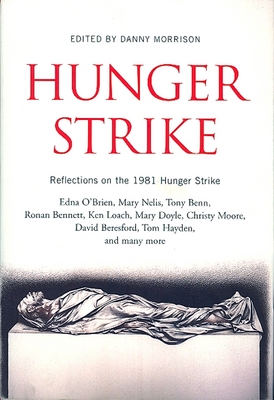Hunger Strike, reflections
David Granville reviews Hunger Strike, reflections on the 1981 hunger strike, Danny Morrison (ed.), Brandon, ISBN 0863223650, £10.99 pbk

LAST YEAR saw the passing of a number of important anniversaries in the Irish politcal calendar, not least of which being the 25th anniversary of the republican hunger strike in the H-blocks of the Maze prison.
As has become increasingly evident since the start of what has become known as the 'Irish peace process', the 1981 hunger strike, which resulted in the deaths 10 IRA and INLA prisoners, was to provide the catalyst for a transformation of the struggle carried out by the Provisional wing of the republican movement.
Over two decades mainstream republican strategy shifted from almost total reliance on armed resistance to the full embrace of politics and a return to the civil rights agenda of the late 1960s.
It was to be a tortuous and painful process, not least for the 3,500 who lost their lives as a result of the conflict arising out of the conditions inflicted upon the nationalist community in the six northern counties of Ireland as a result of partition and unionism's malign garrison stewardship on behalf of the imperial occupying power - Britain.
A significant watershed in the conflict, it was almost inevitable that the 1981 hunger strike anniversary would trigger a string of new books dealing with the campaign and its aftermath.
The first of these, Richard O'Rawe's highly controversial account, Blanketmen: an untold story of the H-block hunger strike, appeared a year early, in 2005. A revisionist take on the H-Block campaign in which the author, the author, the prisoners' press officer at the time of the hunger strike, caused outrage by alleging that the IRA leadership outside the prison had prolonged the hunger strike to serve its own political ends.
It was an accusation vehemently denied by many republicans close to the prison struggle - not least by IRA prisoners' leader at the time, Bik McFarlane, who accused O'Rawe of producing a partially fictional account.
O'Rawe contentious contribution was followed, in 2006, by Denis O'Hearn's masterful biography of Bobby Sands (Bobby Sands: nothing but an unfinished song) and this collection of personal reminiscences, reflections and poems edited by the writer, and prominent Sinn Feiner, Danny Morrison.
I particularly liked the eclectic mix of writing styles and contributors pulled together by Morrison, an impressive array writers, artists, filmmakers, political commentators, trade unionists, journalists, poets, human rights lawyers, actors, historians and political activists.
Contributors, who include Christy Moore, Ronan Bennett, Edna O'Brien, Ken Loach, Peter Sheridan, Robert Ballagh, Tom Hadyn, Timothy O'Grady, Eugene McCabe, Medbh McGluckian, David Beresford, Tony Benn, Cyril Cusack, Mary Pearson and Nell McCafferty, mostly steer clear describing the campaign itself, a story has been told comprehensively elsewhere.
Instead, we are treated to a series of more personal, insightful and moving reflections on the hunger strike and its impact on the individual contributors and on life in Ireland, both at the time of the campaign and in the years which followed.
One of my favourites is a short piece by a former Iranian student, Pedram Moallemian. Entitled 'The Night We Named Bobby Sands Street', he tells the story of how he and a group of student friends, intent on on honouring Sands, changed all the street signs on the road where the British embassy in Tehran was located from Winston Churchill Street to Bobby Sands Street.
When the 'renaming' became officially accepted by the authorities, the embassy decided to change it's postal address to one of the embassy's side street entrances to avoid all correspondence being addressed to British Embassy, Bobby Sands Street.
The contribution of British journalist Roy Greenslade is particularly important for the way in which it succinctly exposes the way in which a hypocritical and largely supine British press distorted the hunger strike campaign and put itself at the service of the Thatcher government's war against Irish republicans.
In addition to the prose pieces, this fine book includes several poems, including a number in the Irish language. The book ends with one of these, Deasún Breatnach's poetic tribute to the ten prisoners who died, Deichniur/Ten.
This book is a fine addition to existing literature on 1981 hunger strike.
The former British Labour MP and long-standing friend of Ireland Tony Benn concludes in his contribution: "...Bobby Sands' cause has prospered and will succeed because peace and justice are what people need and want. Bobby Sands said, before he died, 'Our revenge will be the laughter of our children' - a phrase that says all we need to know about him and looks beyond the bloodshed to true peace."
Despite looking back to the events of 1981, this is precisely what this book is about.
Connolly Association, c/o RMT, Unity House, 39 Chalton Street, London, NW1 1JD
Copyright © 2007 David Granville

